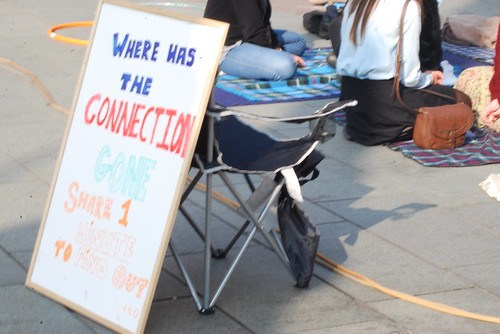
When Hannah sent me a link to the metro piece about one of the bloggers I follow a bit…
Basically person A meets person B, things don’t go so well on the chemistry front. Person A decides things to call it a night or go home. Person B goes away then a few days later, contact Person A wanting compensation in return.
Here’s the story as my date told me
My mystery into who pays on the first date stemmed from a journal I wrote on OkCupid when I went on a date with a previous woman. She had made a bit of a song and dance about paying and I kind of innocently wondered, out loud. I do wonder sometimes if I should wonder a little quieter. This time my post on OkCupid caused a small flurry of comments and discussion (and I guess more dates).
My date brought up who pays on the first date and we natter away about that date. However My date told me a story which literally made my chin drop for ages.
On her previous date, she had gone after a bit of chat back and forth. The man had come across quite strongly and My date decided to give him a chance anyway. On the date he wasn’t really make a good impression, and when the bill came she offered to pay half. The man didn’t think this was a good idea and insisted on paying for the whole thing. My date said again, she was willing to go dutch and split the bill. Again the man insisted to pay for everything. Feeling like she may have insulted his inner ego, she backed down and let him pay.
The man walked her to her bus stop and suggested another date should be on the cards. My date righly said maybe she will see. The next day he called her to see how she was and about the second date. She broke it to him nicely, there wasn’t any chemistry and there wasn’t going to be another date sorry. His answer back was frankly shocking…
He said WHAT? I couldn’t believe it… I felt like I had misheard My date in the low level buzz of Bakerie.
“He said he wanted his money back!”
Yes the man My date had last dated wanted his money back after My date had offered to have pay half orginally.
My date must have sat there looking at my face of shock and horror for about 5mins. Every once in a while I would repeat her words again… “he wanted his money back?”
Both are pretty shocking to be honest even in the face of Dating awkwardness.
As nobaddatesjustgoodstories says,
I don’t come with a money back guarantee. Dates aren’t commodities.
I actually felt angry, because as you’ll know if you read this blog often, I am a massively big believer in women always offering to pay for dates.
His response is just beyond me!
Absolutely… I can not even imagine what it must be like to be treated like this.
However my date had a very good reply, one that was genius…
After a while we broke up in laughter, when it had all sunk in and I could ask what happened next?
My date was a strong willed woman and I just knew that couldn’t be the end of the story. It wasn’t… She told me.
She explained how hurt she felt but she thought on her feet and told him, to send his address to her and she will send him a cheque for the exact amount of the money to the penny.
Oh my date was good! I commented to her… Yes she continued. And I have not heard anything from him since.
I pretty much fell back and clapped my hands, attracted a few glances around the Bakerie environment. “Amazing!”
My date was amazing, and what a story. I thought my dates were bad but she had taken the biscuit, put cheese on top and eaten it whole.
This is only one chapter out of a collection of stories in a book/blog keep meaning to make public… Maybe its about time?













